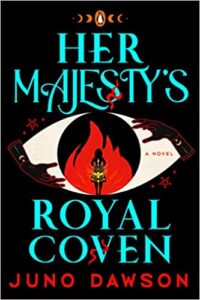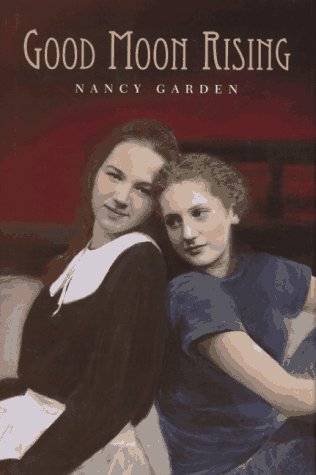Her Majesty’s Royal Coven, written by Juno Dawson, is an enthralling urban fantasy that explores gender in a magical world that, similar to our own, finds itself strictly divided along the binary. It questions concepts of power, friendship, love, and feminism in a world in which traditional power structures are challenged and, to some, are no longer acceptable. Taken together with its fantastic characters and thrilling story, this book is a must-read for anyone who’s a fan of queer witchy stories.
On the night of the summer solstice, five young girls named Helena, Elle, Leonie, and twins Niamh and Ciara are inducted as members of Her Majesty’s Royal Coven (HMRC), the official witch’s coven of the British government. Twenty-five years and one devastating magical war later, the sisters have gone their separate ways. Wealthy Helena is now Headmistress of the HMRC. Leonie has left the coven to start Diaspora, a coven of queer witches and witches of color. This stands in stark contrast to the more conservative HMRC. Elle is a nurse and housewife who has chosen to keep her witchly status secret from her husband and children. Niamh is working as a veterinarian, using her powers to treat animals. However, when the HMRC discovers an incredibly powerful young warlock named Theo who is prophesied to destroy the world, Helena recruits her old friends to help her decide what to do. Things get even more complicated when Theo is revealed to be transgender. Soon, battle lines are drawn. On one side stands Helena, willing to do whatever it takes to maintain the status quo. On the other side stand Niamh, Leonie, and Elle, fighting to nurture and protect this young witch.
Her Majesty’s Royal Coven is filled with great storytelling and relatable characters that feel drawn from real life. Juno Dawson’s writing is full of clever turns of phrase and humor that balance well with the dark nature of the story. The pace of the book never feels rushed. It mixes slower character-focused chapters with more thrilling narrative-focused ones to great effect. The characters and the dynamics between them feel incredibly realistic. You really get the sense that these women had been the closest of friends when they were younger, which makes their split all the more painful to read. In terms of balance between the four main characters, Juno Dawson does a fantastic job of giving each of them arcs that feel complete and integral to the overall story. Even though Niahm and Helena get most of the focus in the story, Leonie and Elle still get moments to shine and fully-fleshed out arcs. Lastly, I loved the magic system in this book. I am always a big fan of magical systems that portray magic as limited and coming with a physical cost. This is not a world in which magic is used in a haphazard or casual fashion. Casting spells in this world comes with a price. This makes the magic feel more grounded while also adding an incredible amount of narrative weight to the characters’ actions in pursuit of their goals.
I loved how Juno Dawson uses the split between the erstwhile best friends as a way to examine one of the most contentious debates within modern feminism: the inclusion of transgender women in traditionally cis women-only spaces. Through the four main characters, readers are presented with varying ways in which people come to this debate in the real world. By giving it apocalyptic consequences, we are shown just how massively important inclusion is for many transgender people. It takes something that is often misunderstood and poorly reported on, presents it in clear terms, and effectively shows how much it means to the people involved. At the same time, Juno Dawson does not treat all sides of the debate equally. Time and time again, events in the narrative make it very clear that transgender women belong in women’s spaces and that choosing otherwise is choosing hate. So, although this book is an exploration of modern gender issues, it is never one that tries to play both sides.
At a personal, character level, Her Majesty’s Royal Coven is also a story about the power of love and hate. Elle, Leonie, and especially Niamh push themselves beyond their physical and emotional boundaries multiple times in the narrative to keep Theo safe. Niamh and Elle especially go to great efforts to understand Theo and see the girl behind the chaotic magic. Despite the danger to themselves, they never once give up on Theo. On the other side, Helena travels a very dark route as she attempts to deny Theo’s personhood. She sacrifices her ideals, betrays her community, and becomes the type of monster she once fought against. All out of her hatred of what she does not understand. This conflict between radical love and unadulterated hate is a perfect allegory for what people, for better or worse, are willing to do in the fight over transgender rights.
Another thing I really applaud Juno Dawson on is how she handles having a main character who ends up being a trans-exclusionary radical feminist (TERF). When I read Helena’s turn to TERFdom, I immediately got nervous. Despite my trust in Juno, I could not help but worry that somehow this would open the door to humanizing anti-trangender arguments. I was also worried that reading a character using anti-transgender hate speech over multiple chapters would be too triggering. Call it naivete or just simple world-weariness. Either way, I was wrong and came away incredibly impressed at how it all was handled. Never once is Helena portrayed as a sympathetic villain. Although you can see the causes of her turn to evil, you never are made to feel sorry for her or given the opportunity to side with her. The narrative shows how fear of the unknown can lead people down dark paths, but never once is lost the point that despite every chance given to reconsider her actions, she never does. Instead, she digs deeper and deeper into her hate, letting it consume her.
I think if I had any complaint about the book it is that I wish that I could have seen more from the queer characters in the book. Leonie, for example, is the only queer main character and she gets the least amount of chapters dedicated to her. So, while the concept of gender is dealt with well in the book, it is mainly examined through the perspectives of cis straight women.
That being said, I loved Her Majesty’s Royal Coven. It is an expertly written story with great characters and a thrilling narrative. Moreover, as a transgender woman living in today’s political climate, I absolutely adored how the debates that shape my life right now were made manifest and dealt with in such powerful terms.

